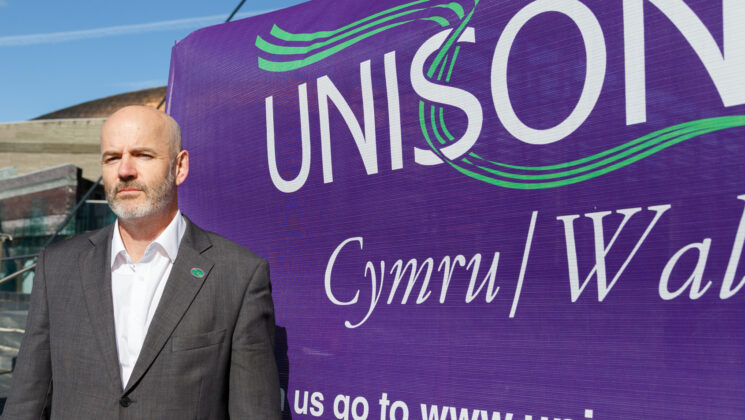UNISON Cymru Wales has challenged Finance Secretary Mark Drakeford AM to make Wales a ‘real’ Living Wage nation where every public service worker earns at least £8.75 per hour. The trade union has today (Wednesday) written an open letter to the minister urging him to provide the extra funding to lift thousands of council workers out of in-work poverty as the Welsh government finalises its budget.
UNISON says £8.75 per hour is the figure identified by the independent Living Wage Foundation as the minimum income needed to survive, based upon a basket of household goods and services.
Just last month, the BBC identified that 15 of the 22 local authorities in Wales pay below £8.45 per hour.
Dominic MacAskill, head of local government said,
“Thousands of council cleaners, caterers, school support staff, carers and many more in Wales work as hard as they can to keep vital local services running. Yet they are trapped in in-work poverty, forced to choose every week what to go without in a struggle to survive. This is a scandal.
“Welsh government deserves credit for insisting the Foundation Living Wage rate must be paid in the NHS, colleges and universities. There is a moral duty to extend decent pay to local government too. Boosting wages means giving people dignity at work and the consequence is a more motivated workforce, increased retention, higher productivity and more money spent on our high streets. We’re asking Mark Drakeford to provide the necessary resources to Welsh councils in the upcoming budget to make this a reality.”
UNISON is seeking to influence the Finance Secretary ahead of the Welsh government budget debate on 5 December.
Notes to editors
- UNISON Cymru Wales’ letter to the Cabinet Secretary reads:
15 November 2017
Dear Cabinet Secretary for Finance,
Last week marked the annual Living Wage Week and you will no doubt be aware that the Living Wage Foundation has released a new living wage rate of £8.75 per hour outside of London.
The arguments for paying the foundation ‘real’ living wage are well rehearsed and sensible. Clearly there is the ethical argument to pay people a fair rate which allows them to live in dignity with a decent standard of living. Then there are the benefits to those who pay the foundation living wage rate which include increased productivity, a motivated workforce, increased retention, and improved employee relations.
UNISON has long campaigned for the ‘real’ living wage rate to be paid across the whole Welsh public sector. We are pleased the foundation rate is paid across the Wales NHS and is being rolled out across all Welsh colleges and universities, which we know has made a real difference for those who benefit from this increase.
However, tens of thousands of local government employees across Wales are still paid below the foundation living wage rate. In fact, a recent BBC Wales report identified that 15 of the 22 local authorities in Wales do not pay the foundation living wage rate.
We want Wales to become a ‘real’ living wage nation and believe this can only be achieved if the Welsh Government demonstrates the political will and leads the way. UNISON therefore renews our call on the Welsh Government to ensure the public sector in Wales is a foundation living wage rate employer, by providing the necessary resources to Welsh councils in the upcoming budget to make this a reality.
I look forward to hearing from you on this important issue.
Yours sincerely,
Dominic MacAskill
UNISON Cymru Wales
Head of Local Government
- In report on 18 October, BBC Wales discovered just under 70% of local authorities in Wales pay staff less than the Real Living Wage – seen by anti poverty campaigners as what is needed to cover basic living costs.
- Details obtained through requests under the Freedom of Information Act show that while Cardiff pays all its employees above that rate and insists its contractors too as well , 44% council jobs in Pembrokeshire are paid below that level as are 46% of jobs with Wrexham council .
- Fifteen of the twenty-two local Welsh authorities do not have a commitment to the Real Living Wage of £8.45 an hour.
- In December 2012 the National Assembly and Welsh Government were among the first to pay it. The seven Welsh health boards have followed suit.
- Anti-poverty campaigners like the Bevan Foundation argue that as well as individuals benefiting by £40 a week for a full time job, employers can expect to see increases in productivity and reductions in absences while communities have more money spent within them.
- UNISON Cymru Wales has been lobbying the UK Conservative government for the public sector pay cap to be scrapped. The trade union has long been campaigning for a Living Wage in local government and took a lead in scoping the feasibility of its introduction for the Finance Minister.
- On 13 October, the Joint Council for Wales, the body which brings together Welsh council employers and trades unions, revealed seven years of pay freezes or below-inflation pay awards driven by the UK government have reduced the spending power of their workforce by 21 per cent in real terms.
Contact
Alastair Gittins, UNISON Press Officer on 07816 538397.
Photo: Tracey Paddison

